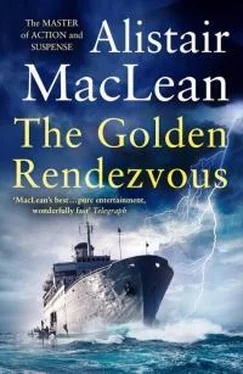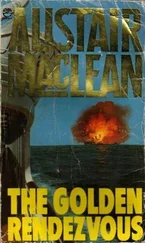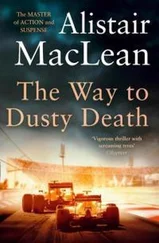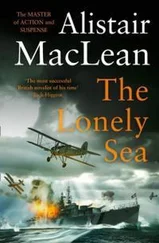And in Kingston the blow had fallen. We had no sooner arrived than the harbour authorities had come on board requesting that a search party from the American destroyer lying almost alongside be allowed to examine the Campari . The search party, about forty of them, were already lined up on the deck of the destroyer.
They were still there four hours later. Captain Bullen, in a few simple well-chosen words that had carried far and clear over the sunlit waters of Kingston harbour, had told the authorities that if the United States Navy proposed, in broad daylight, to board a British Mercantile Marine vessel in a British harbour, then they were welcome to try. They were also welcome, he had added, to suffer, apart from the injuries and the loss of blood they would incur in the process, the very heavy penalties which would be imposed by an international court of maritime law arising from charges ranging from assault, through piracy to an act of war: which maritime court, Captain Bullen had added pointedly, had its seat not in Washington, D.C., but in The Hague, Holland.
This stopped them cold. The authorities withdrew to consult with the Americans. Coded cables, as we learnt later, were exchanged with Washington and London. Captain Bullen remained adamant. Our passengers, 90 per cent. of them Americans, gave him their enthusiastic support. Messages were received from both the company head office and the Ministry of Transport requiring Captain Bullen to co-operate with the United States Navy. Pressure was being brought to bear. Bullen tore the messages up, seized the offer of the local Marconi agent to give the radio equipment an overdue check-up as a heaven-sent excuse to take the wireless officers off watch and told the quartermaster at the gangway to accept no more messages.
And so it had continued for all of thirty hours. And, because troubles never come singly, it was on the morning following our arrival that the Harrisons and Curtises, related families who occupied the for’ard two suites on “A” Deck, received cables with the shocking news that members of both families had been fatally involved in a car crash and left that afternoon. Black gloom hung heavy over the Campari .
Towards evening, the deadlock was broken by the skipper of the American destroyer, a diplomatic, courteous and thoroughly embarrassed commander by the name of Varsi. He had been allowed aboard the Campari , been gruffly asked into Bullen’s day-cabin, accepted a drink, been very apologetic and respectful and suggested a way out of the dilemma.
How would it be if the search were carried out not by his own men but by British Customs officials in the regular course of their duty, with his men present solely in the capacity of observers. Captain Bullen, after much outraged humming and hawing, had finally agreed. Not only did this suggestion save face and salvage honour to a certain degree, but he was in an impossible situation anyway, and he knew it. Until the search was completed, the Kingston authorities refused medical clearance, and until he had this clearance it would be impossible to unload the six hundred tons of food and machinery he had for delivery there. And the port officials could also make things very difficult indeed by refusing clearance papers to sail.
And so what seemed like every Customs official in Jamaica was routed out and the search began at 9 p.m. It lasted until 2 a.m. the following morning. Captain Bullen fumed as steadily and sulphurously as a volcano about to erupt. The passengers fumed, partly because of having to suffer the indignity of having their cabins so meticulously searched, partly because of their being kept out of their beds until the early hours of the morning. And, above all, the crew fumed because, on this occasion, even the normally tolerant Customs were forced to take note of the hundreds of bottles of liquor and thousands of cigarettes uncovered by their search.
Nothing else, of course, was found. Apologies were offered and ignored. Medical clearance was given and unloading began: we left Kingston late that night. For all of the following twenty-four hours Captain Bullen brooded over the recent happenings, then had sent off a couple of cablegrams, one to the head office in London, the other to the Ministry of Transport, telling them what he, Captain Bullen thought of them. And now, it seemed, they in turn had told Captain Bullen what they thought of him. I could understand his feelings about Dr. Slingsby Caroline, who was probably in China by this time.
A high-pitched shout of warning brought us both sharply back to the present and what was going on around us. One of the two chain slings round the big crate now poised exactly over the hatchway to number four hold had suddenly come adrift, one end of the crate dropping down through an angle of 60 degrees and bringing up with a jerking jolt that made even the big jumbo derrick shake and quiver with the strain. The chances were good that the crate would now slip through the remaining sling and crash down on to the floor of the hold far below, which is probably what would have happened if two of the crew holding on to a corner guiding rope hadn’t been quick-witted enough to throw all their weight on to it and so prevent the crate from tilting over at too steep an angle and sliding free. But even as it was it was still touch and go.
The crate swung back towards the side of the ship, the two men on the guide-rope still hanging on desperately. I caught a glimpse of the stevedores on the quayside below, their faces twisted into expressions of frozen panic: in the new people’s democracy where all men were free and equal, the penalty for this sort of carelessness was probably the firing squad: nothing else could have accounted for their otherwise inexplicably genuine terror. The crate began to swing back over the hold. I yelled to the men beneath to run clear and simultaneously gave the signal for emergency lowering. The winchman, fortunately, was as quick-witted as he was experienced, and as the wildly careering crate swung jerkily back to dead centre he lowered away at two or three times the normal speed, braking just seconds before the lowermost corner of the crate crunched and splintered against the floor of the hold. Moments later the entire length of the crate was resting on the bottom.
Captain Bullen fished a handkerchief from his drills, removed his gold-braided cap and slowly mopped his sandy hair and sweating brow. He appeared to be communing with himself.
“This,” he said finally, “is the bloody end. Captain Bullen in the dog-house. The crew sore as hell. The passengers hopping mad. Two days behind schedule. Searched by the Americans from truck to keelson like a contraband-runner. Now probably carrying contraband. No sign of our latest bunch of passengers. Got to clear the harbour bar by six. And now this band of madmen trying to send us to the bottom. A man can stand so much, First, just so much.” He replaced his cap. “Shakespeare had something to say about this, First.”
“A sea of troubles, sir?”
“No, something else. But apt enough.” He sighed. “Get the second officer to relieve you. Third’s checking stores. Get the fourth – no, not that blithering nincompoop – get the bo’sun, he talks Spanish like a native anyway, to take over on the shore side. Any objections and that’s the last piece of cargo we load. Then you and I are having lunch, First.”
“I told Miss Beresford that I wouldn’t–”
“If you think,” Captain Bullen interrupted heavily, “that I’m going to listen to that bunch jangling their money-bags and bemoaning their hard lot from hors d’œuvre right through to coffee, you must be out of your mind. We’ll have it in my cabin.”
And so we had it in his cabin. It was the usual Campari meal, something for even the most blasé epicure to dream about, and Captain Bullen, for once and understandably, made an exception to his rule that neither he nor his officers should drink with lunch. By the time the meal was over he was feeling almost human again and once went so far as to call me “Johhny-me-boy.” It wouldn’t last. But it was all pleasant enough, and it was with reluctance that I finally quit the air-conditioned coolness of the captain’s day-cabin for the blazing sunshine outside to relieve the second officer.
Читать дальше
Конец ознакомительного отрывка
Купить книгу












